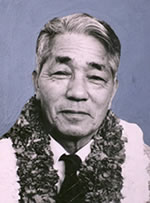|
 You
could say that Taro Higa is the most unique personality in the history
of Okinawan emigration. He was born in Hawaii to Issei (first generation
emigrants) parents and lived an eventful life, traveling between
Okinawa, mainland Japan and the U.S. He was able to see and understand
the cultural and spiritual perspectives of both Japan and the U.S.,
given his background and experience, and he conveyed his thoughts
by publishing books and producing movies. He was also involved in
the relief campaign for war-torn Okinawa. You
could say that Taro Higa is the most unique personality in the history
of Okinawan emigration. He was born in Hawaii to Issei (first generation
emigrants) parents and lived an eventful life, traveling between
Okinawa, mainland Japan and the U.S. He was able to see and understand
the cultural and spiritual perspectives of both Japan and the U.S.,
given his background and experience, and he conveyed his thoughts
by publishing books and producing movies. He was also involved in
the relief campaign for war-torn Okinawa.
His parents emigrated to Hawaii in 1905. Higa was born in 1916 and
would live the life of a typical Nisei Okinawan. When he was a child
he was sent to his grandparents in Okinawa. After dropping out of
junior high school, he began working at a cotton factory in Osaka,
the first of many jobs to come. It is around this time that he experienced
discrimination against Okinawans. He later returned to Hawaii but
traveled to Japan again in 1937 to study electronics. In 1940, with
the war only a year away, he returned home to Hawaii.
When the Pacific War broke out, Higa was sent to the rigorous European war front as part of the Nisei American troops. The soldiers of this unit were drafted amidst discriminatory rumors like "Japanese soldiers will be used as shields in the font lines." Despite these difficulties, the Nisei soldiers fought bravely - and when the battle reached Okinawa, they saved thousands of lives by serving as translators, including their mentors. And even after the war, they visited internment camps to console more than 130,000 Japanese prisoners.
Higa was a man with overflowing enthusiasm and sense of justice, being involved in post-war relief campaign and political campaign in Okinawa. He led the large relief campaign to support the rebuilding of post-war Okinawa and contributed significant effort to deliver relief aid.
Also worth noting is that, in 1946, he protested the U.S. law prohibiting naturalization for Japanese. He argued that the law was discriminatory and thus began what would become a great movement toward its amendment. At the time, the Alliance for Successful Acquisition of Naturalization prosecuted campaigns from the end of 1946 to the spring of 1947. At that time Higa was the chief editor for the Colorado Times in Hawaii and did everything he could do in terms of public speech, advertisement, and calls for donation for the cause. The hard work eventually paid off when, in 1952, naturalization rights were granted for Japanese.
There is no one quite like Taro Higa, who possessed a pioneering spirit burning with love for the homeland and never ceased to convey the truth on emigration. You could say that he was a Nisei who had what Okinawans call "Chimugukuru" (warm-heartedness) and Hawaiian hospitality.
|